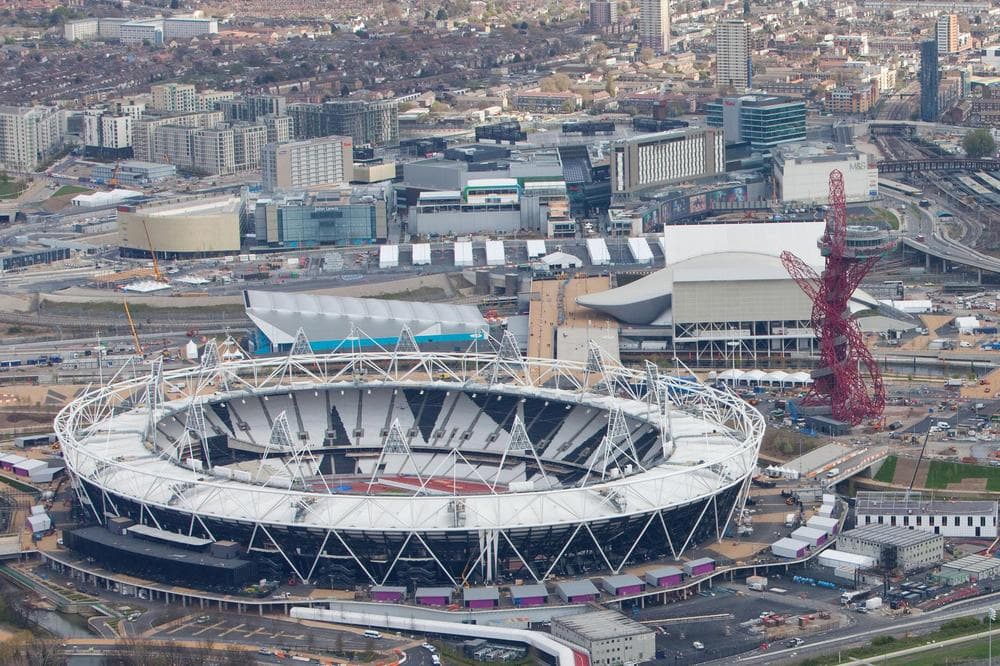Advertisement
Olympic Gold Going Green In London
Resume
To environmental expert Dan Epstein, the 2012 Summer Olympics will be more than a showcase for world-class athletic prowess. During his almost three years as Head of Sustainability for the upcoming London Games, Epstein had the task of living up to the promise of "the most sustainable Olympics ever."
"Going green" has been an Olympic mantra since the 1990s. The 2010 Winter Games in Vancouver drew particular notice for its high environmental standards in building the Olympic Village, but as Epstein drove around the majestic venues on the 500-acre Olympic site in East London, he noted that just getting started here raised the degree of difficulty.
"When we talk about sustainability," Epstein said, "the most important thing or the biggest move that we made was to come to this site. It was very, very industrialized, very contaminated. There was a couple of million tires on the site. There were hundreds of thousands of fridges and other white goods just deposited here. There was an oil refinery.”
In addition, the site had host of chemical factories and a nearly century-old dumping site for mustard gas cannisters from World War I. That level of pollution meant setting up a chain of soil processing plants to decontaminate the surroundings.
Standing outside a few minutes later, Epstein pointed to the looming 80,000-seat stadium that represents another environmental first in Olympic preparation: It can easily be taken apart after the games.
“It’s designed in a very unique way to be the first stadium that can be de-mountable," he said. "So 55,000 seats plus the whole roof structure are literally designed to be taken down after the Games and to be reused elsewhere or to be recycled. So we’ve designed a stadium that will leave a 25,000 seat athletic structure - which is what we need, we don’t have one of those in the city - as a legacy. But we don’t want any white elephants.”
Before the 2016 Summer Olympics were awarded to Rio de Janeiro, London's Olympic committee had serious discussions with Olympic organizers in Chicago, which also bid for the 2016 games, about transporting the massive stadium to the Windy City.
While Rio doesn't seem interested in taking delivery, Brazilian officials are scoping out the 12,000-seat basketball arena, similarly created to be dismantled and moved after the games. Meanwhile, Epstein figures that if necessary, the steel beams left over from downsizing the larger stadium can be re-purposed: the large metal panels smelted, and the excess concrete crushed and reused.
“So then as you come around, you see the Aquatics Center, which will have two fifty meter pools, the first Olympic quality pools in the city.”
The forces of sustainability are also at work in the architecturally stunning Aquatics Center. Inside the swimming and diving facility, old water from the pool is even rerouted to the bathrooms, where it reaches fleets of low-flush toilets.
For all of the green ambitions of Olympic planners, there's no shortage of critics and watchdogs, including John Gold, a professor of urban historical geography. Gold and his wife Margaret co-edited the book Olympic Cities, which looks at sustainability successes and failures at recent Olympiads.
Gold pointed to the housing in the Olympic Village, which will eventually be occupied by Londoners after the games. He contended that it does not do enough in areas such as water recycling and energy conservation to reach Level Six, the highest rung of the United Kingdom's building code for sustainable homes.
“The standards that have been adopted for the Village were less than should have been, and the standards that are likely to be delivered at the end are probably less than they should be," Gold said. "If it was being built to full sustainability, it would have been built to Level Six. It’s not. It’s being built to Level Four, so it’s 44 percent sustainability as against 100 percent.”
London Assemblyman Darren Johnson belongs to the Green Party and serves as deputy chair on the city's environment committee.
“It looks as well that the renewable energy targets that the Olympic organizers set themselves of generating 20 percent of the energy used during the Games by renewable resources, they say they are really struggling to meet that target," Johnson said.
That number will likely drop to 11 percent, in part because plans for massive wind turbines were scrapped. The longer-range goal of inspiring greater sustainability throughout England is similarly in doubt. A recent poll sponsored by General Electric found that just 12 percent of the public believe that the green example of the coming Olympics will rub off.
“You know our carbon footprint and the environment is on everyone’s mind now, so whether it’s about your own personal life or it’s about the Olympics, I think everyone is hoping we can do more for the environment and do things a bit smarter than we did 20 or 30 years ago,” said one rider on the London Underground.
But proponents and critics at least can agree that when it comes to going green, the 2012 Summer Games and their aftermath are bound to set some Olympic records.
This segment aired on April 21, 2012.